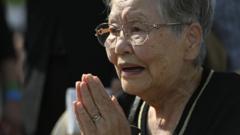As Hiroshima commemorates the atomic bombing, voices resonate for global peace and nuclear disarmament.
Remembering Hiroshima: 80 Years of Reflection on Nuclear Legacy

Remembering Hiroshima: 80 Years of Reflection on Nuclear Legacy
The poignant 80th anniversary of the atomic bombing of Hiroshima sheds light on the ongoing struggles against nuclear weapons and the quest for lasting peace.
In a solemn ceremony attended by Japanese Prime Minister Shigeru Ishiba and global representatives, Hiroshima reflected on the devastating impact of the atomic bomb, which resulted in over 200,000 casualties, on August 6, 1945. Hiroshima Mayor Kazumi Matsui underscored the city's unique position as the only site to have suffered such an attack, emphasizing the Japanese commitment to peace and the vital leadership role Japan must play in nuclear disarmament initiatives.
The memories of survivors, like Shingo Naito, evoke a powerful narrative of trauma, as victims tragically recount their experiences of loss and suffering stemming from the bombing. Naito, who lost his father and siblings, has dedicated his efforts to ensure that the narratives of Hiroshima's past are immortalized through art and education.
This year, the call for global nuclear disarmament is louder than ever. Mayor Matsui voiced concerns over the rise of military buildups worldwide and challenged the notion that nuclear weapons are essential for national defense. He pointed to the nuclear Non-Proliferation Treaty, warning it was nearing dysfunctionality and urged the Japanese government to endorse the Treaty on the Prohibition of Nuclear Weapons, active since 2021, which has garnered approval from over 70 countries.
However, Japan's security policies remain intertwined with the protection of U.S. nuclear capabilities, sparking ongoing debates within the nation about the role of nuclear armament. Public sentiment varies, with demonstrations calling for the complete abolition of nuclear weapons gaining traction.
Echoing the sentiments of his fellow survivors, Saitoshi Tanaka articulated how current global violence revives painful memories of Hiroshima. He lamented, "Mountains of rubble and fleeing civilians paint a dire picture reminiscent of my experiences," advocating strongly for public outrage against nuclear armament to insist leaders in nuclear-capable countries act.
As Hiroshima marks this significant anniversary, the interplay of memory, peace advocacy, and ongoing global tensions fuels an urgent discussion regarding the future of nuclear weapons and the resilience of peacebuilding efforts.



















